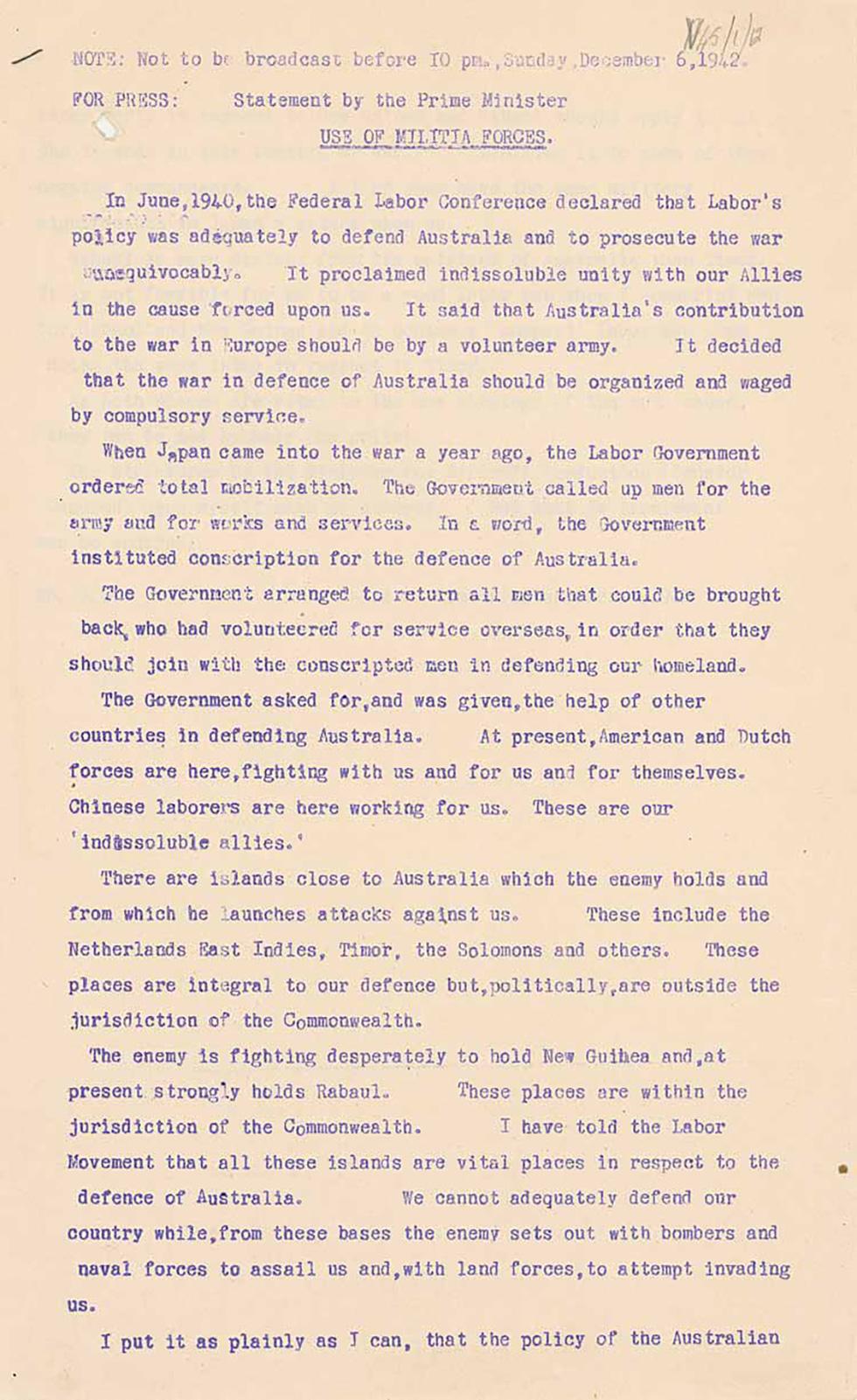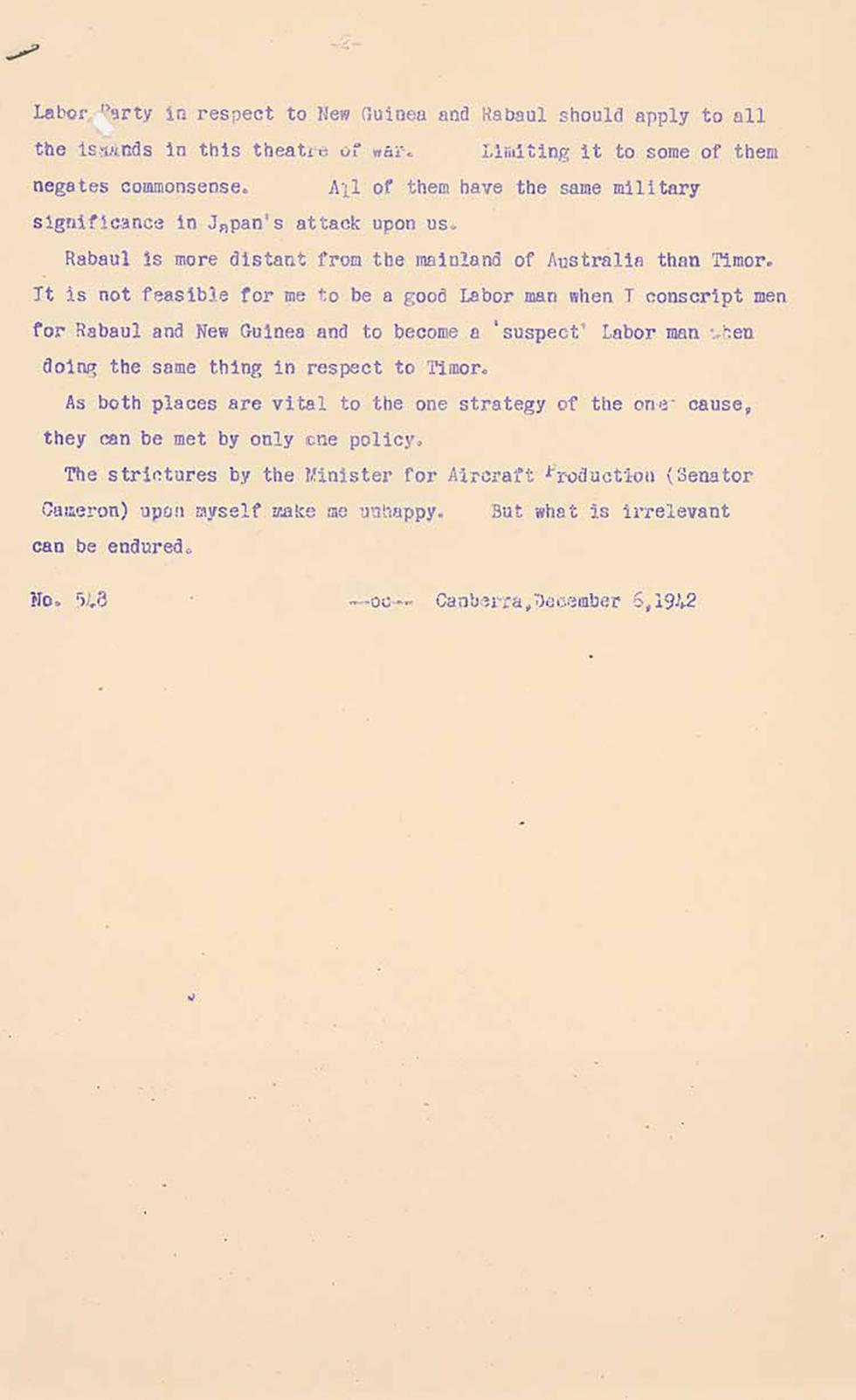

Aboriginal and Torres Strait Islander people should be aware that the National Archives' website and collection contain the names, images and voices of people who have died.
Some records include terms and views that are not appropriate today. They reflect the period in which they were created and are not the views of the National Archives.



[Page 1.]
[Handwritten in top right corner:] V45/1/12
NOTE: Not to be broadcast before 10 pm., Sunday, December 6, 1942.
FOR PRESS: Statement by the Prime Minister
[Underlined heading:] USE OF MILITIA FORCES.
In June, 1940, the Federal Labor Conference declared that Labor’s policy was adequately [sic] to defend Australia and to prosecute the war unequivocably [sic]. It proclaimed indissoluble unity with our Allies in the cause forced upon us. It said that Australia’s contribution to the war in Europe should be by a volunteer army. It decided that the war in defence of Australia should be organized and waged by compulsory service.
When Japan came into the war a year ago, the Labor Government ordered total mobilization. The Government called up men for the army and for works and services. In a word, the Government instituted conscription for the defence of Australia.
The Government arranged to return all men that could be brought back, who had volunteered for service overseas, in order that they should join with the conscripted men in defending our homeland.
The Government asked for, and was given, the help of other countries in defending Australia. At present, American and Dutch forces are here, fighting with us and for us and for themselves. Chinese laborers are here working for us. These are our 'indissoluble allies.'
There are islands close to Australia which the enemy holds and from which he launches attacks against us. These include the Netherlands East Indies, Timor, the Solomons and others. These places are integral to our defence but, politically, are outside the jurisdiction of the Commonwealth.
The enemy is fighting desperately to hold New Guinea and, at present strongly holds Rabaul. These places are within the jurisdiction of the Commonwealth. I have told the Labor Movement that all these islands are vital places in respect to the defence of Australia. We cannot adequately defend our country while, from these bases the enemy sets out with bombers and naval forces to assail us and, with land forces, to attempt invading us.
I put it as plainly as I can, that the policy of the Australian
[Page] -2-
Labor Party in respect to New Guinea and Rabaul should apply to all the islands in this theatre of war. Limiting it to some of them negates commonsense [sic]. All of them have the same military significance in Japan’s attack upon us.
Rabaul is more distant from the mainland of Australia than Timor. It is not feasible for me to be a good Labor man when I conscript men for Rabaul and New Guinea and to become a 'suspect' Labor man when doing the same thing in respect to Timor.
As both places are vital to the one strategy of the one cause, they can be met by only one policy.
The strictures by the Minister for Aircraft Production (Senator Cameron) upon myself make me unhappy. But what is irrelevant can be endured.
No. 548
Canberra, December 6, 1942
This is a press statement issued by Prime Minister John Curtin (1885-1945) on 6 December 1942. It relates to Australia's current position in the Pacific theatre of the Second World War, the country's relationships with and responsibilities to her allies, particularly the United States, and conscription for overseas service. It is part of an extensive Prime Minister’s Department file on the use of militia outside Australia.
Learning resource text © Education Services Australia Limited and the National Archives of Australia 2010.
Learn how to interpret primary sources, use our collection and more.
